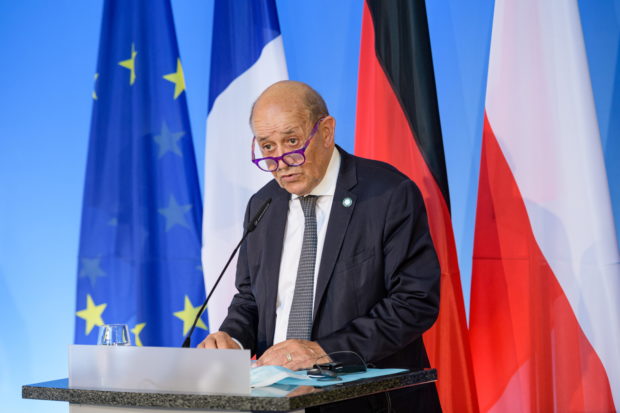
French Foreign Minister Jean-Yves Le Drian attends a joint news conference at the Bauhaus University in Weimar, Germany September 10, 2021. REUTERS FILE PHOTO
PARIS — France announced Wednesday it will return its ambassador to Australia, ending a weeks-long diplomatic protest over Canberra’s decision to scrap a submarine contract.
Paris recalled its envoy on September 17, enraged at Australia’s decision to tear up a landmark defense contract worth about US$65 billion in favor of a US offer.
Foreign Minister Jean-Yves Le Drian told parliament the ambassador would now return to Canberra with “two objectives”.
He said envoy Jean-Pierre Thebault would “define our relationship with Australia in the future” and “firmly defend our interests” as the two sides negotiate a settlement.
Since the contracts for the 12 French attack submarines had already been signed, the severance deal could cost Australia hundreds of millions of dollars.
The ambassador’s planned return was welcomed by Australia’s government.
Treasurer Josh Frydenberg said he hoped the allies could now “move beyond our recent disappointments”.
“Obviously the two countries, France and Australia, share a number of common interests, particularly in our work together in the region. So, let’s hope we can get that relationship back on track,” he told Channel 9 television.
French President Emmanuel Macron reacted furiously to Australia’s announcement on September 15 that it had secretly lined up a new, nuclear-powered submarine deal with the United States and Britain.
French Foreign Minister Jean-Yves Le Drian accused Australia of back-stabbing and the United States of betrayal, calling the move reminiscent of the unilateralist attitude of former president Donald Trump.
Paris recalled its envoys to both Australia and the United States over the furore.
But Macron later ordered the ambassador to Washington to return to his post after a call with US President Joe Biden, which helped soothe tensions.
France, however, made clear it was not in a rush to mend fences with Australia, and kept its envoy to Canberra in Paris.
France’s anger stemmed not only from the financial loss of the submarine deal but also the shattering of an alliance with Australia that it saw as a cornerstone of its Indo-Pacific security strategy.